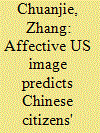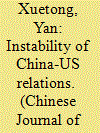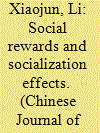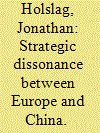|
|
|
Sort Order |
|
|
|
Items / Page
|
|
|
|
|
|
|
| Srl | Item |
| 1 |
ID:
098868


|
|
|
|
|
| Publication |
2010.
|
| Summary/Abstract |
There is abundant literature in the United States on the images that the Americans hold of China, particularly regarding how the China image has evolved over time and the possible impacts of the China image on US-China relations. It will be interesting to figure out the other side of the coin, that is, how the Chinese view the United States and whether the US image plays any part in their foreign-policy preferences toward the United States. Research in this direction needs an interdisciplinary exploration into areas of international relations theory, social psychology, and public opinion analysis.
Various international relations theories give contrasting answers to the question whether national image really matters in foreign-policy decision-making. There is no place for national image in structural realism. Systemic constructivism as expounded by Wendt focuses on the static concept of identity rather than the dynamic one of national image. On the other hand, when scholars dig into the microscopic world of foreign-policy decision-making, images of other countries, among other things, are an important explanatory factor.1
|
|
|
|
|
|
|
|
|
|
|
|
|
|
|
|
| 2 |
ID:
098866


|
|
|
|
|
| Publication |
2010.
|
| Summary/Abstract |
China and the United States signed a joint statement during US President Barack Obama's four-day state visit to China in November 2009 in which President Obama and Chinese President Hu Jintao, 'reached agreement to advance China-US relations in the new era'.1 These relations, however, soured after successive fallings-out over US trade sanctions on Chinese seamless steel tubes, Secretary of State Hilary Clinton's criticism of China's internet freedom, US arms sales to Taiwan, and Obama's meeting with the Dalai Lama in the White House-that began only one month after Obama's visit and carried on through to February 2010.2 Just as political commentators began to understand the reasons for this 180-degree shift over such a short period they were taken back afresh on April 2 when the relationship made a rapid recovery, evident in the hour-long telephone conversation that day between President Hu and President Obama on cooperation.3 Few appeared to have noticed that sudden deteriorations followed by rapid recoveries have been the norm in China-US relations since the 1990s. This article explains the enduring phenomenon using a theory of superficial friendship-namely the policy of pretending to be friends.
|
|
|
|
|
|
|
|
|
|
|
|
|
|
|
|
| 3 |
ID:
098872


|
|
|
|
|
| Publication |
2010.
|
| Summary/Abstract |
From the time China's UN membership was reinstated in 1972, the country has been a growingly active player on the world stage, having entered into economic cooperation, arms control, human rights and environmental protection with 150 international and non-governmental organizations (NGOs). Growing involvement in international institutions, however, implies binding oneself to their rules and regulations, including violation penalties. It can also mean forgoing certain national interests or even sovereignty rights. Although economic and material motivations often trigger the decision to cooperate, there are also instances where material motivations are less clear.
|
|
|
|
|
|
|
|
|
|
|
|
|
|
|
|
| 4 |
ID:
098870


|
|
|
|
|
| Publication |
2010.
|
| Summary/Abstract |
Relations between China and the European Union (EU) are in a profound state of transition. As one China-specialist observed, 'The breadth and depth of Europe-China relations are impressive, and the global importance of the relationship ranks it as an emerging axis in world affairs.'1 A former European Commissioner declared in the same vein, 'We all have to become China-experts.' Premier Wen Jiabao called the Sino-European partnership 'mature, balanced and determined', citing its economic complementarity as solid evidence of further growth. This article evaluates the evolving China-EU relationship and tests its potential to develop into a strategic axis in world affairs. The next section presents a concise historical account of EU-China relations and discusses the drivers that generate expectations of a strategic partnership. The third section elaborates on Europe's conditional engagement and how it has tried to socialize China with its own norms. Finally, the article takes stock of the extent of convergence with regard to the norms that underpin international politics.
|
|
|
|
|
|
|
|
|
|
|
|
|
|
|
|
|
|
|
|
|